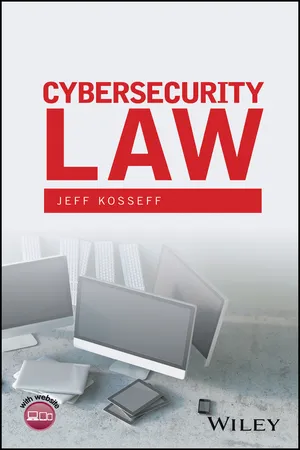Cybersecurity Law
About this book
A definitive guide to cybersecurity law
Expanding on the author's experience as a cybersecurity lawyer and law professor, Cybersecurity Law is the definitive guide to cybersecurity law, with an in-depth analysis of U.S. and international laws that apply to data security, data breaches, sensitive information safeguarding, law enforcement surveillance, cybercriminal combat, privacy, and many other cybersecurity issues. Written in an accessible manner, the book provides real-world examples and case studies to help readers understand the practical applications of the presented material. The book begins by outlining the legal requirements for data security, which synthesizes the Federal Trade Commission's cybersecurity cases in order to provide the background of the FTC's views on data security. The book also examines data security requirements imposed by a growing number of state legislatures and private litigation arising from data breaches. Anti-hacking laws, such as the federal Computer Fraud and Abuse Act, Economic Espionage Act, and the Digital Millennium Copyright Act, and how companies are able to fight cybercriminals while ensuring compliance with the U.S. Constitution and statutes are discussed thoroughly. Featuring an overview of the laws that allow coordination between the public and private sectors as well as the tools that regulators have developed to allow a limited amount of collaboration, this book also:
• Addresses current U.S. and international laws, regulations, and court opinions that define the field of cybersecurity including the security of sensitive information, such as financial data and health information
• Discusses the cybersecurity requirements of the largest U.S. trading partners in Europe, Asia, and Latin America, and specifically addresses how these requirements are similar to (and differ from) those in the U.S.
• Provides a compilation of many of the most important cybersecurity statutes and regulations
• Emphasizes the compliance obligations of companies with in-depth analysis of crucial U.S. and international laws that apply to cybersecurity issues
• Examines government surveillance laws and privacy laws that affect cybersecurity as well as each of the data breach notification laws in 47 states and the District of Columbia
• Includes numerous case studies and examples throughout to aid in classroom use and to help readers better understand the presented material
• Supplemented with a companion website that features in-class discussion questions and timely and recent updates on recent legislative developments as well as information on interesting cases on relevant and significant topics
Cybersecurity Law is appropriate as a textbook for undergraduate and graduate-level courses in cybersecurity, cybersecurity law, cyber operations, management-oriented information technology (IT), and computer science. This book is also an ideal reference for lawyers, IT professionals, government personnel, business managers, IT management personnel, auditors, and cybersecurity insurance providers.
JEFF KOSSEFF is Assistant Professor of Cybersecurity Law at the United States Naval Academy in Annapolis, Maryland. He frequently speaks and writes about cybersecurity and was a journalist covering technology and politics at The Oregonian, a finalist for the Pulitzer Prize, and a recipient of the George Polk Award for national reporting.
Tools to learn more effectively

Saving Books

Keyword Search

Annotating Text

Listen to it instead
Information
Chapter 1
Data Security Laws and Enforcement Actions
- FTC Data Security
- State Data Breach Notification Laws
- State Data Security Laws
- State Data Disposal Laws
1.1 FTC Data Security
1.1.1 Overview of Section 5 of the FTC Act
(1) whether the practice, without necessarily having been previously considered unlawful, offends public policy as it has been established by statutes, the common law, or otherwise – whether, in other words, it is within at least the penumbra of some common-law, statutory, or other established concept of unfairness; (2) whether it is immoral, unethical, oppressive, or unscrupulous; (3) whether it causes substantial injury to consumers (or competitors or other businessmen).3
- direct costs to the parties;
- paperwork;
- restrictions on information flows;
- reduced innovation; and
- restrictions on capital formation.
Table of contents
- Cover
- Title Page
- Copyright
- Table of Contents
- Dedication
- About the Author
- Acknowledgment
- About the Companion Website
- Introduction
- Chapter 1: Data Security Laws and Enforcement Actions
- Chapter 2: Cybersecurity Litigation
- Chapter 3: Cybersecurity Requirements for Specific Industries
- Chapter 4: Cybersecurity and Corporate Governance
- Chapter 5: Anti-Hacking Laws
- Chapter 6: Public–Private Cybersecurity Partnerships
- Chapter 7: Surveillance and Cyber
- Chapter 8: Cybersecurity and Federal Government Contractors
- Chapter 9: Privacy Laws
- Chapter 10: International Cybersecurity Law
- Appendix A: Text of Section 5 of the FTC Act
- Appendix B: Summary of State Data Breach Notification Laws
- Appendix C: Text of Section 1201 of the Digital Millennium Copyright Act
- Appendix D: Text of the Computer Fraud and Abuse Act
- Appendix E: Text of the Electronic Communications Privacy Act
- Index
- End User License Agreement
Frequently asked questions
- Essential is ideal for learners and professionals who enjoy exploring a wide range of subjects. Access the Essential Library with 800,000+ trusted titles and best-sellers across business, personal growth, and the humanities. Includes unlimited reading time and Standard Read Aloud voice.
- Complete: Perfect for advanced learners and researchers needing full, unrestricted access. Unlock 1.4M+ books across hundreds of subjects, including academic and specialized titles. The Complete Plan also includes advanced features like Premium Read Aloud and Research Assistant.
Please note we cannot support devices running on iOS 13 and Android 7 or earlier. Learn more about using the app
